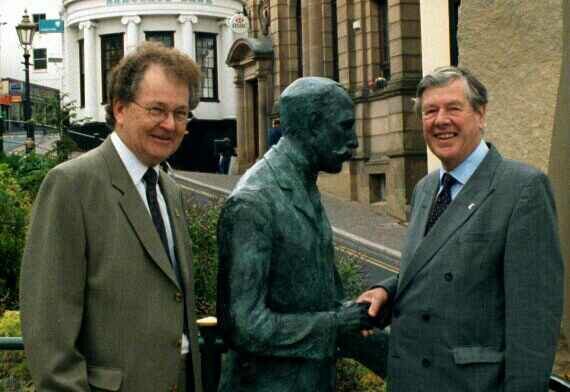Elgar, Edward (1857 - 1934)
b June 2, 1857, Broadheath, Worcestershire, England.
d. Feb. 23, 1934, Worcester, Worcestershire
in full SIR EDWARD WILLIAM ELGAR English composer whose works in the orchestral idiom of late 19th-century Romanticism--characterized by bold tunes, striking colour effects, and mastery of large forms--stimulated a renaissance of English music.
The son of an organist and music dealer, Elgar left school at age 15 and worked briefly in a lawyer's office. He was an excellent violinist, played the bassoon, and spent periods as a bandmaster and church organist. He had no formal training in composition. After working in London (1889-91), he went to Malvern, Worcestershire, and began to establish a reputation as a composer. He produced several large choral works, notably the oratorio Lux Christi (1896; The Light of Life), before composing in 1896 the popular Enigma Variations for orchestra. The variations are based on the countermelody to an unheard theme, which Elgar said was a well-known tune he would not identify--hence the enigma. Repeated attempts to discover it have been unsuccessful. All but the last of the 14 variations refer cryptically to friends of Elgar, the exception being his own musical self-portrait. This work, highly esteemed by Hans Richter, who conducted the first performance in 1899, brought Elgar recognition as a leading composer and became his most frequently performed composition. In 1900 there followed another major work, the oratorio The Dream of Gerontius, which many consider his masterpiece. Based on a poem by John Henry Cardinal Newman, it dispensed with the traditional admixture of recitatives, arias, and choruses, using instead a continuous musical texture as in the musical dramas of Wagner. The work was not well received at its first performance in Birmingham, but after it was acclaimed in Germany, it won British favour.
Elgar, a Roman Catholic, planned to continue with a trilogy of religious oratorios, but he completed only two: The Apostles (1903) and The Kingdom (1906). In these less successful works, representative themes are interwoven in the manner of the leitmotivs of Wagner. Other vocal works include the choral cantata, Caractacus (1898), and the song cycle for contralto, Sea Pictures (1900).
In 1904 Elgar was knighted, and from 1905 to 1908 he was the University of Birmingham's first professor of music. During World War I he wrote occasional patriotic pieces. After the death of his wife in 1920, he curtailed his music writing severely, and in 1929 he returned to Worcestershire. Friendship with Bernard Shaw eventually stimulated Elgar to further composition, and at his death he left unfinished a third symphony, a piano concerto, and an opera.
Elgar's principal works of a programmatic nature are the overture Cockaigne, or In London Town (1901), and the "symphonic study" Falstaff (1913). Of his five Pomp and Circumstance marches (1901-07; 1930), the first became particularly famous. Also highly esteemed are his two symphonies (1908 and 1911), the Introduction and Allegro for strings (1905), and his Violin Concerto (1910) and Cello Concerto (1919).
The first English composer of international stature since Henry Purcell (1659-95), Elgar liberated his country's music from its insularity. He left to younger composers the rich harmonic resources of late Romanticism and stimulated the subsequent national school of English music. His own idiom was cosmopolitan, yet his interest in the oratorio is grounded in the English musical tradition. Especially in England, Elgar is esteemed both for his own music and for his role in heralding the 20th-century English musical renascence.
|
|
[Below] Contribution below from SterlingTimes visitor Ian Morris
Sir Edward Elgar (1857 - 1934) is probably the most famous of English composers. Certainly he was a true patriot.
He was born in West Worcestershire and for much of his working life he lived in and around Malvern.
It was on 10th May 1901, at his home in Wells Road, Malvern, that he called his friend Dorabella into his study and said "I've got a tune that will knock 'em flat !" He then sat down at his piano and played Pomp and Circumstance March No.1 in D major, later to be known as "Land of Hope and Glory". The first orchestral performance of this, with the solo vocal, was at the coronation of King Edward VII in Westminster Abbey the following year.
It is a strange coincidence that the centenary of this composition is likely to coincide almost exactly with the next general election, anticipated in May of this year. Could this be an omen for Great Britain's future exit from the European Union ?
A life-size bronze statue of Sir Edward Elgar, in the centre of Malvern, was unveiled by the Duke of York last June (2000) just a couple of weeks before a visit to Malvern by Jeffrey Titford - leader of the UK Independence Party. The attached photo shows (left to right) Ian Morris, UKIP's prospective parliamentary candidate for West Worcestershire, with Sir Edward and Jeffrey Titford.
One of the present-day electors in West Worcestershire constituency is Nigel Kennedy - whose recordings of Elgar's violin concerto are world famous. Nigel Kennedy lives in West Malvern.
Sir Edward Elgar is buried at St Wulstan's church, Malvern. He would probably turn in his grave if he could see what had happened to his "land of hope and glory".

|

